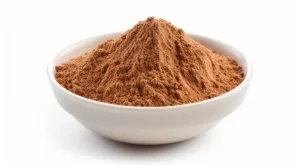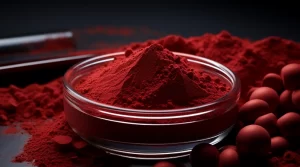La función de la luteína

¿Qué es la luteína?
Lutein is a fat-soluble pigment that belongs to the Carotenoids family. There are more than 600 carotenoids in nature, of which 30-50 are part of the normal human diet.
Carotenoids can be divided into two major categories: non-polar carotenes (carotenes, such as β-carotene and lycopene) and polar xanthophylls (such as lutein and zeaxanthin).
Because lutein biosynthesis occurs only in plants, algae, bacteria, and certain fungi, the primary intake of lutein in humans depends on diet or supplementation.
Studies have shown that for every 10% increase in dietary lutein intake, serum lutein concentration will increase by 2% to 4%.
Lutein is mainly distributed in the eyes (retina, rod outer segments, lens) and other parts of the human body, including the skin, cervix, brain and breasts.
What are the proven effects of lutein?
Luteína is beneficial for regulating blood lipids
Dyslipidemia is a controllable risk factor for the development of cardiovascular disease and is characterized by elevated plasma concentrations of triglycerides, total cholesterol, or low-density lipoprotein cholesterol and reduced concentrations of high-density lipoprotein cholesterol.
Dyslipidemia alone or in combination with other modifiable risk factors such as diabetes, hypertension, obesity, low physical activity levels, and smoking can significantly increase the risk of cardiovascular events such as myocardial infarction, ischemic stroke, or death from coronary heart disease. risk of occurrence
A literature meta-analysis (including 7 randomized controlled trials) pointed out that lutein/zeaxanthin supplementation can significantly increase high-density lipoprotein cholesterol (HDL-C) in older adults (age ≥ 60 years old) level.
Lutein supplementation may have a positive effect on blood lipid regulation in the elderly, but it is limited by the small sample size and more research is needed to further verify it.
Lutein benefits brain health in older adults
Aging changes the cellular, vascular and structural characteristics of the brain, leading to declines in cognitive function, attention and memory, and delays in cognitive information processing.
Structurally, brain volume or weight declines at a rate of 5% every decade starting at age 40, and the actual rate of decline may increase with age, especially over age 70.
A systematic review (including nine studies) found that three intervention studies using MRI in healthy older adults showed that lutein had an effect on brain activity in terms of learning, resting-state connectivity, and gray matter volume. positive influence.
Another 4 cross-sectional studies using MRI showed that lutein was positively associated with brain structure and neural efficiency during cognitive tasks.
Lutein may have beneficial effects on brain health in healthy older adults.
Lutein is beneficial for retinopathy of prematurity
Retinopathy of prematurity, defined as a progressive disease, is a multifactorial retinal disease characterized by abnormal retinal vascular development.
In addition to causing blindness and severe visual impairment, retinopathy of prematurity often occurs with other neonatal diseases, such as neurological dysfunction, brain dysplasia, necrotizing enterocolitis, intraventricular hemorrhage, and bronchopulmonary dysplasia
A meta-analysis of the literature (including 3 randomized controlled trials with a total of 406 premature infants less than 32 weeks old) pointed out that oral lutein/zeaxanthin failed to reduce the incidence of retinopathy of prematurity and did not reduce the incidence of retinopathy of prematurity. Risk of bronchopulmonary dysplasia, sepsis, necrotizing enterocolitis, and mortality.
Oral lutein failed to reduce the incidence of retinopathy of prematurity.
Lutein benefits cognitive function
As people age, many changes occur, both physical and psychological.Some changes may be good, some not
Changes in cognitive function as a normal aging process are well documented in the scientific literature
Some cognitive abilities, such as vocabulary, are resilient to brain aging and may even improve with age. Other abilities, such as conceptual reasoning, memory, and processing speed, gradually decline over time.
A systematic review (Systematic Review, including 5 randomized controlled trials) pointed out that supplementing lutein (daily dose of 10 mg for 12 months) has the effect of improving some cognitive function indicators, such as: visual episodic memory ( visual episodic memory) and inhibition.
Lutein supplementation will have a positive impact on the cognitive function of different age groups, but the relevant results still need to be confirmed by more large-scale trials.
Lutein benefits age-related macular degeneration
Age-related macular degeneration is a progressive vision impairment associated with neurodegeneration of retinal pigment-photoreceptor cells, with common symptoms being central vision blurring, distortion, and vision loss.
Age-related macular degeneration is the leading cause of central vision loss in developed countries, with age being the strongest predictor, although it occurs less frequently in people under 50 years of age than in patients aged 65 to 74 years. Risk increases more than threefold in patients over 75
A meta-analysis (including 9 randomized controlled trials with a total of 855 patients with macular degeneration) pointed out that supplementing lutein or related compounds (10 or 20 mg per day for more than 6 months) can help Increase macular pigment density (MPOD), and improve visual acuity and contrast sensitivity.
Lutein supplementation or related compound formulas have positive effects on macular degeneration, but are limited by the high heterogeneity among studies and need to be confirmed by more long-term large-scale trials.
Lutein is good for bone health
Bones are dynamic tissues with structural and metabolic functions. Structurally, bones protect vital organs from damage by mechanical forces, provide levers to transmit forces from one area of the body to another, and provide attachment points for muscle-driven movements.
From a metabolic perspective, bones contain a large number of blood cell types and are the body’s largest calcium store.
Adequate nutrition, mechanical loading, hormonal status, and genetic factors are required to maintain bone homeostasis, and disruption of any of these factors may have deleterious consequences.
An observational study of 63 healthy adults reported that although serum lutein and zeaxanthin concentrations were not associated with bone mass, macular pigment density (MPOD) was significantly associated with proximal femoral and lumbar spine BMD.
Long-term intake of a lutein-rich diet is strongly associated with better bone status and may reduce the likelihood of clinical outcomes such as osteoporosis and fracture risk.
Lutein improves dark adaptation ability
Dark adaptation is the process by which the eyes become more sensitive to light when the light is reduced.
For example, if you enter a dark area from a well-lit place (e.g., go to a movie), your eyes will be dark at first, but you will start to see clearly after a while.
Clinically, dark adaptation is a measure of visual function that has been shown to be a symptom of retinal diseases (such as macular degeneration, macular edema, retinitis pigmentosa, diabetes, and hypertensive retinopathy), as well as : Vitamin A deficiency, exposure to light, smoking, aging, and tissue hypoxia can also cause reduced dark adaptation ability.
Two observational studies found that macular pigment concentration is related to dark adaptation, and those with higher concentrations have significantly better dark adaptation abilities.
Higher macular pigment levels help enhance visual function under low-light conditions (and lutein intake can improve macular pigment)
Lutein increases frequency of physical activity
Physical activity is defined as any physical movement of skeletal muscles that results in energy expenditure. According to the American College of Sports Medicine, to promote and maintain health, all healthy adults need at least 30 minutes of moderate-intensity aerobic exercise 5 days per week. or at least 20 minutes of high-intensity aerobic exercise 3 days a week
Physical inactivity is a modifiable risk factor for cardiovascular disease and a variety of chronic diseases, including diabetes, cancer (colon and breast cancer), obesity, hypertension, bone and joint disease (osteoporosis and osteoarthritis), and depression
A systematic literature analysis (Systematic Review, including 17 studies) pointed out that higher lutein levels may be related to more frequent physical activity, which may help improve physical activity and reduce the risk of chronic diseases.
The underlying mechanism may be related to the fact that lutein crosses the blood-brain barrier, regulates the functional characteristics of neurons, and affects the communication between neurons.
There is a positive correlation between lutein levels and the frequency of physical activities. Those with higher levels also participate in more physical activities.
Luteína benefits diabetic retinopathy
Diabetic retinopathy is currently the number one cause of blindness in people aged 20 to 60 years. During the 10 years after the onset of diabetes, the probability of developing retinopathy in patients with type 1 and type 2 diabetes is 100% and 60%, respectively. The blindness rate is 20 times that of the average person
Although the risk of disease can be reduced through early detection, blood sugar/blood pressure and blood lipid control, it is often difficult to achieve clinically.
A randomized, double-blind, placebo-controlled trial (31 weeks, 31 patients with non-proliferative diabetic retinopathy) reported that lutein supplementation improved visual function compared to placebo (especially in patients with low Contrast sensitivity to spatial frequency).
For diabetic retinopathy, lutein supplementation may improve visual function, but more research is needed to confirm the feasibility of being used as an additional therapy.
Lutein improves stress resistance
Stress generally refers to all physical and psychological reactions caused by external stimuli. Although benign stress can bring about growth, extreme or repeated stressful events are often related to cardiovascular diseases, immune diseases, mental disorders and cancer.
A randomized double-blind controlled study (12 months, 59 healthy adults) pointed out that the intake of lutein and zeaxanthin can help improve psychological stress, serum cortisol, and sub-health status assessment questionnaire values.
Oral lutein may have the effect of reducing psychological stress and improving physical and emotional health, but it is limited by the number of samples and more research is needed to confirm it.
Lutein reduces cancer incidence
About 30% of cancers are linked to five major behavioral and dietary risks: high body mass index, low fruit and vegetable intake, physical inactivity, smoking and alcohol consumption.
Compared with residents of Western countries, Asians are 25 times less likely to develop prostate cancer and 10 times less likely to develop breast cancer, but as lifestyles become more Westernized, the incidence of these cancers has increased significantly.
A case-control study (521 women) showed that higher blood concentrations of carotenoids (alpha-carotene, beta-carotene, lycopene, lutein/zeaxanthin) were associated with lower breast cancer The incidence is related. Note 3
Another literature meta-analysis (meta-analysis, including 10 studies, 1958 cases of esophageal cancer, 4529 cases of control group) pointed out that carotenoids (beta-carotene, alpha-carotene, lycopene, beta-cryptoxanthin , lutein and zeaxanthin), the lower the risk of esophageal cancer.
Another case-control study (1993 colorectal cancer patients and 2410 controls) pointed out that higher intake of lutein-rich foods (including: spinach, broccoli, lettuce, tomatoes, diced orange juice, carrots, Celery and green vegetables) can significantly reduce the risk of colorectal cancer.
Higher intake of lutein from food is associated with lower cancer risk, but whether additional supplementation is effective remains to be confirmed
Lutein improves visual adaptation
Glare disability refers to the temporary loss of visual accuracy caused by uncontrolled light such as high intensity within the visual range. Glare not only easily causes eye fatigue, affects reading and learning, but may also cause traffic accidents.
In addition, recovery from light stimulation means that it takes a period of time for the eyes to return to normal vision after exposure to strong light. Aging and abnormalities in visual cells may increase the recovery time.
Several studies have found that supplementing lutein and zeaxanthin (12 mg daily for 6-12 months) can significantly increase the density of macular pigment, in addition to improving the temporary glare disability caused by strong light. phenomenon and helps reduce the time required for recovery from light stimulation.
Lutein benefits intellectual performance
There are many definitions of intelligence, including but not limited to abstract thinking, understanding, self-awareness, communication, reasoning, learning, emotional knowledge, and the ability to plan and solve problems.
And intelligence is not just about learning book knowledge, academic skills, or exam techniques. It reflects a broader and deeper ability to understand the environment around us.
Intelligence, the ability to grasp or understand things, or figure out what to do, is also often seen as a predictor of academic achievement, job performance and income.
An observational study (114 adults with a BMI ≥ 25 kg/m²) pointed out that regardless of body fat percentage, subjects with a higher density of macular pigments (referring to lutein molecules in the retina) had significantly better health outcomes. Intelligence level (intelligence is measured by the Kaufman Brief Intelligence Test).
In addition, this study further found that macular pigment has an impact on intelligence, especially in improving fluid intelligence.
*Fluid intelligence: refers to the ability to solve problems, create and flexibly respond to challenges in new situations without prior knowledge.
Macular pigment density can be regarded as an independent indicator for predicting intelligence, and those with higher macular pigment density have better intellectual performance.
Lutein reduces the incidence of cataracts
Cataract is a disease caused by the denaturation of proteins in the lens of the lens. It can cause the originally clear lens to turn cloudy, which in turn affects the light entering the retina, causing vision loss.
Compared with other eye diseases (such as glaucoma, macular degeneration, diabetic retinopathy), cataracts are the leading cause of blindness in people over the age of 40 in Asia
A meta-analysis (including 8 population observation studies) pointed out that those with higher blood concentrations of lutein and zeaxanthin can help reduce the risk of nuclear cataracts (by 27% and 37% respectively) , but not for other forms of cataract (such as cortical and subcapsular cataracts).
Another comprehensive analysis of the dose-response literature also pointed out (meta-analysis, including 6 prospective generation studies with 41,999 participants) that higher intakes of lutein and zeaxanthin in the diet can reduce the risk of heart disease by 25%. Prevalence of nuclear cataract.
The mechanism behind it is related to the antioxidant properties of lutein, which can scavenge peroxides, hydroxyl free radicals, lipofuscin, and protect cell membranes from ultraviolet and blue light damage.
*Nuclear cataract (the most common type of senile cataract
Appropriate intake of lutein can help reduce the incidence of some types of cataracts, but considering the possible bias in the included studies, more controlled intervention studies need to be further confirmed.
Lutein prevents cardiovascular and metabolic diseases
Cardiovascular and related metabolic abnormalities can be said to be a major component of various health problems. People with metabolic abnormalities are three times more likely to suffer from cardiovascular disease than the average person. Related cardiovascular risk factors include high blood pressure, High cholesterol, high blood sugar
A large-scale systematic review (including 71 studies with a sample size of 387,000 people) and meta-analysis pointed out that higher intake of lutein or lutein concentration in the blood Higher, helps achieve the following state (data found after mathematical analysis).
Reduces the risk of coronary heart disease (a cardiovascular atherosclerotic disease that causes angina and myocardial infarction) by 12%
Reduce the risk of stroke by 18%
Reduces the risk of metabolic syndrome (a health problem that includes obesity, blood pressure, blood sugar, and dyslipidemia) by 25%
The underlying mechanism is believed to be related to the antioxidant and anti-inflammatory effects of lutein. These two factors are one of the main causes of cardiovascular disease and metabolic disease.
Lutein improves visual recognition function
Modern people are highly dependent on 3C, which often causes premature eye aging. If the following phenomena occur, it may be typical visual aging, such as narrowing of the field of vision, slow response to visual information, difficulty in adjusting the focal length, and poor light adaptability, etc.
In a recent controlled study, it was found that taking lutein and zeaxanthin can increase visual processing ability (especially the ability to distinguish objects and light sources) by 20%, which is beneficial to driving safety, reading speed, sports performance, and cognition. Execution can significantly help Note 1
Lutein improves skin aging
Skin aging is a complex physiological process. It is currently known that it can be mainly divided into endogenous aging (related to genes), which is usually irreversible. The second type is exogenous aging, mainly related to ultraviolet radiation damage, also known as photoaging.
Even though these two aging processes are independent of each other, the molecular mechanisms are the same, namely reactive oxygen damage (naturally generated by cell metabolism), which often causes collagen degradation or reduced synthesis. Note 2
There are no shortcuts or magic pills for anti-aging. The best strategy is through a good lifestyle and antioxidant foods.
A double-blind controlled study pointed out that in addition to helping to improve overall skin tone and brightness, lutein and zeaxanthin can also increase the minimum redness-causing dose (Minimal Erythema Dose) of the skin, which may have the effect of whitening and improving skin quality.
The mechanism behind it is related to the antioxidant properties and photoprotective activity of lutein and zeaxanthin, which can reduce the formation of melanin and reduce the damage of harmful light.
Lutein relieves visual fatigue
Modern people are often inseparable from computers at work, and mobile phones and tablets are always at hand during leisure time. As a result, the eyes often experience discomfort such as soreness, numbness, swelling, and pain. These symptoms represent a distress signal sent by the eyes. Therefore, After every 30 minutes of focused eye use, please rest for 5 to 10 minutes to avoid accelerated eye aging.
In a study on visual fatigue, it was found that taking lutein compound (in the experiment, the subjects were first asked to proofread text for 2 hours, and the reactions after taking lutein were observed) can indeed reduce the fatigue caused by frequent eye use. Fatigue discomfort and stress index note
() ()


